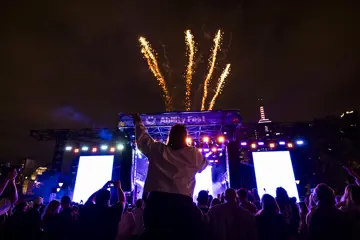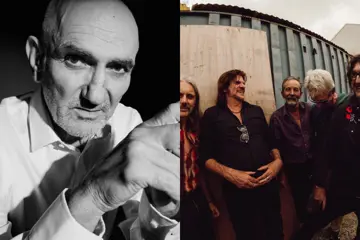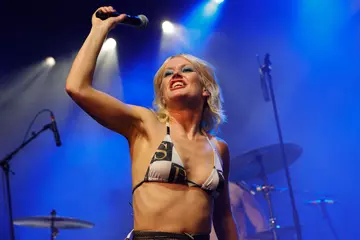As a co-founder of the annual Splendour In The Grass, Jessica Ducrou is no stranger to problem-solving in the world of music festivals. However, when the pandemic hit, all the rules seemed to go out the window. So, how can you go ahead with a massive music fest, featuring some of the biggest names from around the world, without anyone leaving their homes?
“It has been such a long road and such a complicated project, with so many twists and turns,” Ducrou says.
“It’s been one of the hardest things that I’ve ever worked on, just in terms of it being new and communicating what it is and the challenges of the medium. I’m not a tech person, I'm a music promoter. So trying to apply that real-life perspective of events into the digital world, it’s been incredibly challenging.”
Splendour XR, a 3D rendered festival optimised for VR headsets and gaming computers happening across Saturday 24 and Sunday 25 July, is the result of all that hard work. Ducrou and her team have created something that feels like the futuristic 2021 we were promised in the ‘80s.
The show is set to feature performances from the likes of The Killers, Khalid, CHVRCHES, Tash Sultana, Amyl & The Sniffers and heaps more, all dialling into the web and performing in the virtual world.
“I was actually pretty adverse to the idea of taking a festival online,” Ducrou admits of the early stages of building Splendour XR.
Don't miss a beat with our FREE daily newsletter
“When I think about the essence of what a festival is - beyond people buying a ticket to see their favourite bands - ultimately it's about connecting with their friends and meeting new people, and how do you do that in a digital way?
"And there are social media apps that are doing that all over the joint, but how do you make it work in this environment? That’s probably the most thing important thing to me: that it’s not just this passive experience that you’re just sitting there and watching. That you feel connected to a like-minded community where you can hang with your friends and you can meet new people. That’s the model that I wanted to present.”
She continues, “Because we haven’t shown the performances to anyone, it’s hard to explain that overlay: you have the world, but then you also have these ‘party in a box’ effects which are these live effects you can do while people are in-world. You can do rain, nighttime, daytime, lightning, you can drop balloons, you can have fireworks, and you have everyone moving about the space, and then you add the content?
"It all comes together in a way where the performance is actually one of, if not the most important part of it. You’ll see this rich music experience that you can watch with your friends and meet new people by - which is exactly what the music festival experience is.”
While the Splendour team have worked hard to recapture the live music event so many have been craving over the past year and a half, Ducrou is adamant that this is not a new direction for live music, but rather a new branch to coexist with real-life concerts.
“I probably had a fairly large vision, and there have been plenty of challenges along the way where we’ve had to adjust and compromise on what we may have wanted," she says.
"I think the most important thing to underscore is that nothing replaces a real, live experience. That is the key and it’s integral to us all, because that’s not what this is. This is a different experience, a different type of experience, that is just adding to another platform that we can share music on.
“The people who think of music more traditionally, I think they find this medium somewhat of a threat. People have felt threatened by commercialised streaming, but what has come out of the pandemic is that people are using technology and leaning on technology in a whole new way. You can hate it all you like, but you’re going to get left behind. It’s here to stay, and you need to figure out a way of utilising it effectively.”
The promoter also believes that with the industry ever-changing, the new approaches to delivering music can be a huge benefit to both performers and punters alike.
“I think, in the future, the expectations of artists are going to be significantly more than they are now," she tells.
"Writing a song and performing it is one part, but I feel like they are now going to have to become content creators, and I think that people's expectations of engagement with music are going to change. In ten years time, we are going to be in a very different place.
"Think about ten years ago: we weren’t seeing videos of bands in their rehearsal rooms or seeing them sharing music instantly. It’s changed already. It is very much about creative content now, and I think that is going to become very much a part of how an artist represents in the future.
"Artists are earning, people are earning doing this. It’s filling a void at the moment, and I think it can exist alongside a real festival in the future. What it’s about is being accessible globally.
"Anyone from around the world can experience this and do so at an affordable entry price. I think it enhances your overall festival experience. You know, maybe next year, go to Splendour in real life, have a great time, and then experience the VR version the week after.”
Splendour XR launches from next Saturday, 24 July. For line-up info, tickets and more, check out theGuide.

















